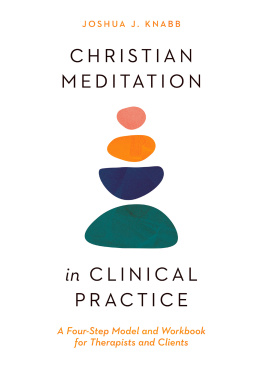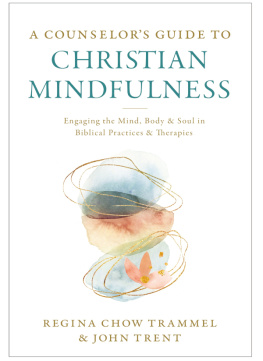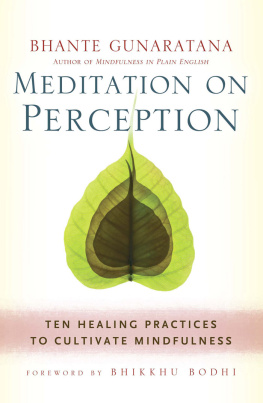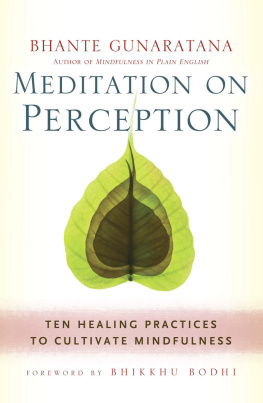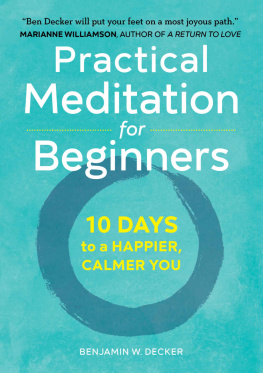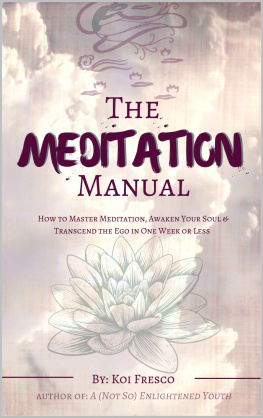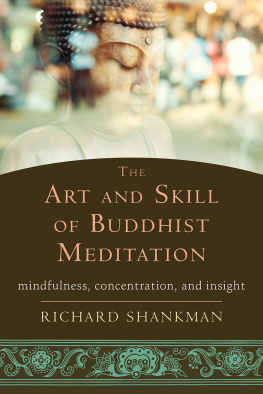Sommaire
Pagination de l'dition papier
Guide
Christian
Meditation
in CLINICAL
PRACTICE
A Four-Step Model and Workbook
for Therapists and Clients
Joshua J. Knabb
InterVarsity Press
P.O. Box 1400, Downers Grove, IL 60515-1426
ivpress.com
2021 by Joshua J. Knabb
All rights reserved. No part of this book may be reproduced in any form without written permission from InterVarsity Press.
InterVarsity Press is the book-publishing division of InterVarsity Christian Fellowship/USA, a movement of students and faculty active on campus at hundreds of universities, colleges, and schools of nursing in the United States of America, and a member movement of the International Fellowship of Evangelical Students. For information about local and regional activities, visit intervarsity.org.
All Scripture quotations, unless otherwise indicated, are taken from The Holy Bible, New International Version, NIV. Copyright 1973, 1978, 1984, 2011 by Biblica, Inc. Used by permission of Zondervan. All rights reserved worldwide. www.zondervan.com. The NIV and New International Version are trademarks registered in the United States Patent and Trademark Office by Biblica, Inc.
While any stories in this book are true, some names and identifying information may have been changed to protect the privacy of individuals.
The publisher cannot verify the accuracy or functionality of website URLs used in this book beyond the date of publication.
Cover design and image composite: Autumn Short
Image: brown background Valentin Salja @valentinsalja / unsplash
ISBN 978-1-5140-0025-0 (digital)
ISBN 978-1-5140-0024-3 (print)
This digital document has been produced by Nord Compo.
This workbook is dedicated to my wife,
ADRIENNE,
who gently reminds me, with just the right touch of grace,
to slow down and stay in the present moment
in order to savor all of Gods blessings.
Acknowledgments
TO BEGIN, I WOULD LIKE TO THANK my wife, Adrienne, and children, Emory and Rowan, who inspire me to improve and grow as a husband, father, and fellow sojourner in this short and messy life. Also, I would like to recognize my editor, Jon Boyd, who has believed in this project ever since we had a brief, casual conversation upon meeting at a conference several years back. Moreover, I would like to express appreciation to the two anonymous reviewers, who took the time to provide helpful feedback so as to strengthen the project. Furthermore, I would like to acknowledge the many Christian authors who have traveled before me over the last two millennia, offering much-needed psychological and spiritual insights into the human condition from a distinctly biblical worldview. Finally, I would like to give thanks to God as my faithful, trustworthy tour guide, who gently and lovingly welcomes me back whenever I have wandered off the paths of life in a futile attempt to travel alone.
Introduction
A man cannot look up to heaven and down to earth both at the same time. There is an opposition between these two, between the earthly-mindedness that has been opened to you, and minding of heavenly things.
JEREMIAH BURROUGHS, A TREATISE ON EARTHLY-MINDEDNESS
Instead of seeing God man sees himself.
DIETRICH BONHOEFFER, ETHICS
REVERBERATIONS OF THE FALL
For a moment, try to imagine what it must have been like for Adam and Eve in those early days of human history. After God made Adam from dust and Eve from Adams rib, both were naked and exposed yet seemingly experienced no sense of loneliness, inadequacy, or shame. Although we do not know the exact details, for a period of time they likely felt a sense of contentment in their daily communion with God, with no apparent awareness of the suffering that would emanate from a future estrangement. Yet, as this famous story unfolds, we quickly learn that Adam and Eve ate from the forbidden tree, then immediately realized they were naked, something they had previously failed to notice. Mindful of their exposed state, they automatically covered themselves with leaves, then lurked in the shadows, hoping God would not see them in their vulnerable condition. Along with the more obvious spiritual impact of this fateful decision, we can also envision a range of possible psychological consequences in those first few years of existence: rumination, worry, emotional distress and confusion, behavioral avoidance, guilt and shame, self-doubt and self-confusion, and a newfound, enduring uncertainty about living in an ambiguous, dangerous world.
Fast forward to the twenty-first century, and we continue to live in the midst of suffering. In fact, psychological pain seems to be a rather ubiquitous experience in contemporary Western society. In your own daily life, for example, you may be struggling with a range of difficult inner and outer experiences, losing hope that things will somehow get better in the near or distant future. Among other forms of psychological suffering, you may get stuck in unhelpful thinking processes, have a hard time identifying emotions or tolerating distress, use avoidance as an ineffective coping strategy, strive for unrealistic standards of perfection, and struggle to understand yourself and deepen your relationships with others.
Difficult thoughts, feelings, behaviors, self-judgments, and relationships may even prevent you from living the life God has called you to live as a Christian. If so, this workbook is for you, a Christian client in professional counseling or psychotherapy who is working with a mental health professional to experience positive psychological and spiritual change. In the pages that follow, I will be offering both a Christian and a psychological view of suffering in contemporary society, along with a wide variety of meditative exercises to help you (1) respond differently to difficult inner and outer experiences, and (2) improve your relationship with God and find a deeper contentment in him as you walk with him along the roads of life. Although the fall of humankind continues to impact us to this very day, as Christians we do have options for living a life of hope and endurance as we patiently wait for Gods eventual restoration of a broken existence.
From this larger Christian perspective, the Bible has given us a grand narrative for making sense of human suffering. Although God created us to be in communion with him and experience enduring contentment and psychological health, we turned away, leading to estrangement, discontentment, and psychological suffering. In other words, rather than walking with God, we frequently veer off the path he has called us to walk with him on. Still, God has offered us a redemptive plan, based on the incarnation and atoning work of Jesus Christ. Therefore, through our union with Christ, we have access to a restored communion with God, a deeper contentment in him, and psychological health, even in the midst of a fallen world. As we patiently wait for God to restore our fragmented existence, we can learn to steadily walk with him from moment to moment, cultivating a more lasting inner satisfaction, untethered to the adversities of life, which will never fully go away on this side of heaven.
In this introduction chapter, I discuss the importance of better understanding a Christian worldview, especially in the context of suffering, given Christianity will serve as the foundation for this workbook. Moreover, I explore some of the more recent trends in the psychology literature to help you understand the role that psychological science plays in ameliorating suffering. Then, I introduce you to some of the Christian concepts, writings, and interventions I draw from throughout the workbook, before concluding with a discussion on the workbooks intended audience, general outline, and format for each of the subsequent intervention chapters.

